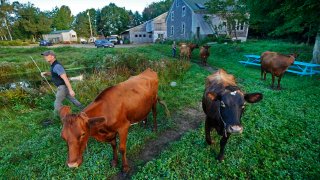
Food was faring well in Maine on Tuesday as election results showed voters backing a first-of-its-kind constitutional amendment guaranteeing residents the right to grow, harvest and eat according to their own wishes.
A statewide "right to food" referendum asked voters if they favored an amendment to the Maine Constitution “to declare that all individuals have a natural, inherent and unalienable right to grow, raise, harvest, produce and consume the food of their own choosing for their own nourishment, sustenance, bodily health and well-being.” It’s an experiment not tried before by any state.
It was well ahead Tuesday night, with two-thirds of the precincts reporting results.
Supporters used the campaign to make the case the amendment would ensure the right to grow vegetables and raise livestock in an era when corporatization threatens local ownership of the food supply. They positioned the amendment as a chance for Mainers to wrestle control of the food supply back from large landowners and giant retailers with little connection to the community.
Get New England news, weather forecasts and entertainment stories to your inbox. Sign up for NECN newsletters.
But opponents cast the drive as deceptively vague. They also said it represented a threat to food safety and animal welfare, and could encourage residents to try to raise cows in their backyards in cities like Portland and Bangor.
Sen. Craig Hickman, a Democrat and longtime supporter of the amendment, said he was “inspired this legislative session by the amount of bipartisanship that went into this amendment.” The Maine Legislature previously approved the proposal by a wide margin. However, it also needs the approval of voters to amend the Maine Constitution.
The proposed amendment was the result of effort by members of the state’s food sovereignty movement. The movement includes small farmers, raw milk fans, libertarians, liberals and anti-corporate activists who all feel local communities should have more of a say in the future of the food supply.
Local
Maine enacted a food sovereignty law, the nation’s first of its kind, in 2017. That law allows local governments to OK small food producers selling directly to customers on site. Other states around the country have passed similar laws in the years since Maine passed its law.



